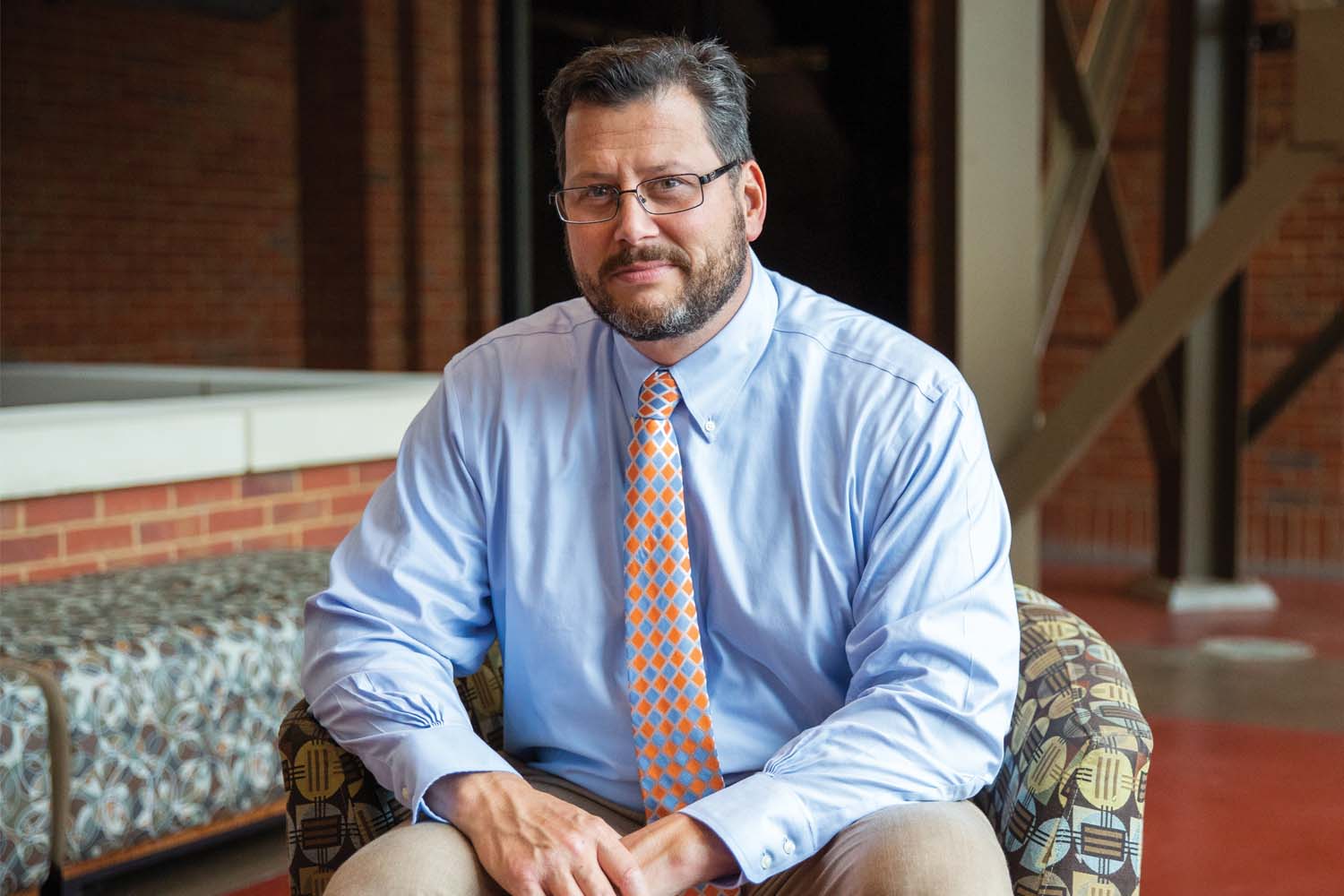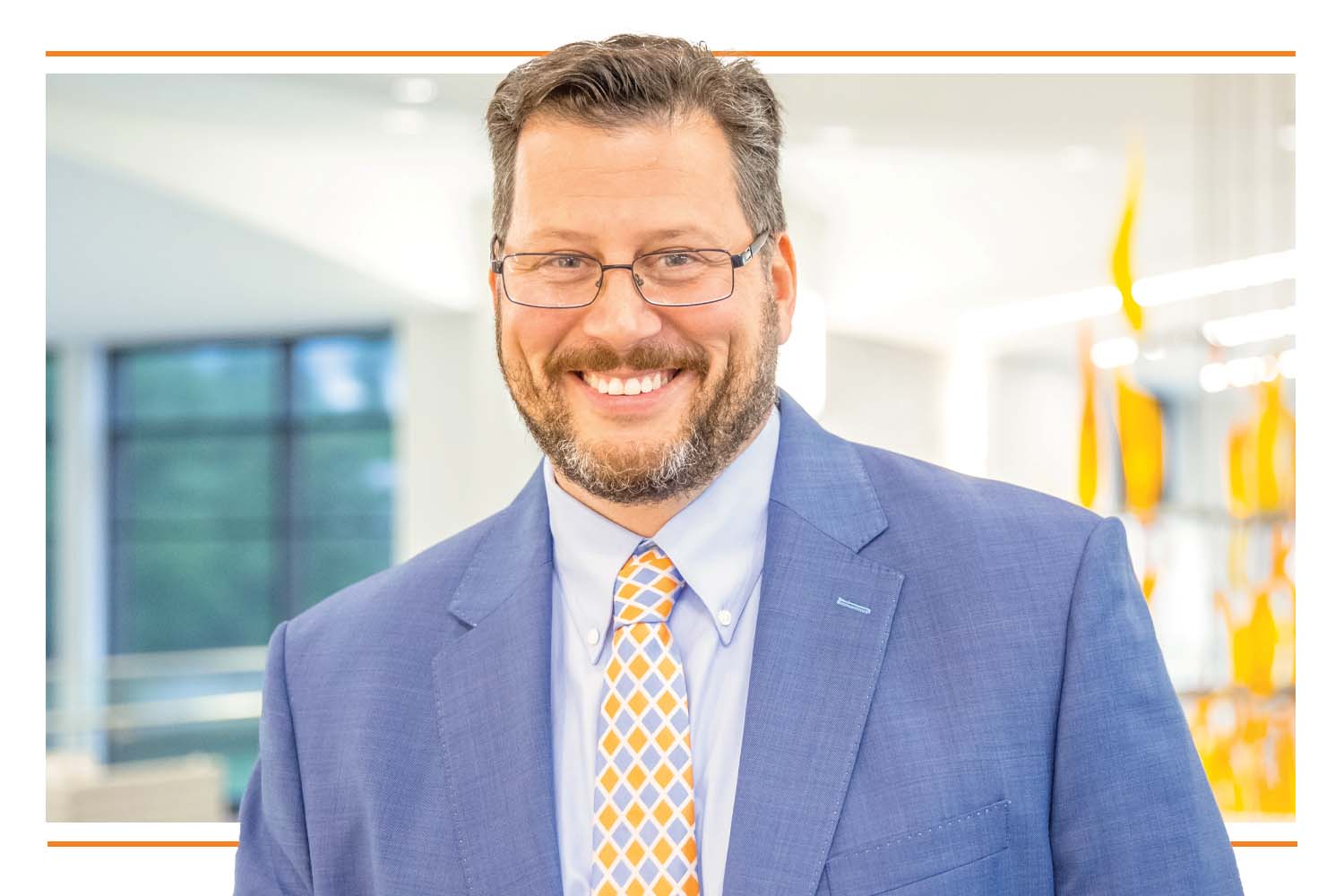Countless adages highlight the importance of growth and change as society has continued to transform across the centuries.
By David Goddard. Photography by Jessica Tezak
For the Tickle College of Engineering, the time has come for taking on new challenges with bold steps in a number of areas, according to Dean Matthew Mench.
“We need to increase our impact in many ways—in terms of faculty, students, research, and with respect to the offerings that we have to serve the needs of the state and nation,” said Mench, the Wayne T. Davis Dean’s Chair of the college and a Chancellor’s Professor. “At its core, engineering is about envisioning and creating things that ultimately help people live better lives. Our engineers need to continually be challenged to think big, to explore new ideas, and to be trained to become leaders of the future.
Mench was also quick to point out that the goal is not to grow just for the sake of becoming bigger but to keep several considerations and end goals in mind.
For the student, faculty, and staff populations, for example, he said he hopes and expects that women and historically underrepresented populations will see a sizable increase in enrollment in the college.
“We currently have nearly a thousand women enrolled in the college, which is a great number—but we need to make more progress,” Mench said.
Currently, the college has 181 faculty members who are responsible for a combined $78 million in external funding. He would like to get that number up to the $100 million mark in expenditures and more than 200 faculty members in the next three years.
“We don’t have unlimited resources,” Mench said. “We need to grow in strategic areas that bring a return on investment in terms of the quality of education and resources we have available. Everyone across the academic landscape is talking growth. What I see less often is people growing with strategic purpose and intent. It’s easy enough just to add faculty and see what happens, but we have a tremendous opportunity to grow with a vision and in alignment with the university.”
As part of serving the state and its educational needs, Mench envisions an increased role for the college in helping develop and maintain Tennessee’s workforce and in serving a non-traditional returning student population. He noted that online courses are beginning to take hold across campus, including the recent launch of an online Master of Science degree program in computer science which will start in the fall of 2022.

Mench stressed that any new programs would be of the highest standard and not at all like the video conferencing that became widespread when the pandemic made many jobs virtual.
“The growth of our online programs will be intentional, designed specifically for online education with the highest standards,” he said. “The core of what we do is educate the next generation of engineers, but we can also serve people currently in the workforce. We need to be able to provide retraining opportunities, continuous training courses, and midlife, midcareer development, with residential or online programming.”
Even with the newfound push in mind, Mench said traditional students will always be at the center of what the college does.
“Our core will always be residential programs and the campus experience, but online offerings will be expanded and help us reach more people and help them prosper along their career trajectory,” he said.
His time as a faculty member, as department head, and as interim vice chancellor for research all reinforced for him the idea that the Volunteer spirit is alive and well on campus and is something people take seriously.
“To get the full Volunteer experience, you need to be on campus,” Mench said. “Online will be important in the coming years, but we still want people here physically on campus to have those moments that define us as Volunteers. We’ve been Volunteers for 209 years, and we’re still going to be Volunteers in 200 more.”
As far as growing and diversifying the opportunities for those students, Mench has ideas as well.
He said one of the reasons he came to UT was its strong reputation in energy research, something that he wants to continue to foster even while developing new partnerships and national research strategies, including expanding the college’s research impact in aerospace and defense and in biomedical sciences.
The core of what we do is educate the next generation of engineers for the state, but we can also serve people currently in the workforce.”
Additionally, Mench sees a wealth of opportunities within the college itself.
His past experiences have prepared him to approach collaborative opportunities from a perspective of research, education, and workforce development. Mench recounted that such projects in recent years included multi-college partnerships with Eastman and Volkswagen.
While welcoming the challenge, Mench noted that the complexity of doing things at the college level is more energizing than working at the department level. He compared it to putting together a 1000-piece jigsaw puzzle compared to a 200-piece one.
“The task is much more challenging, but it is also more fun,” he said. “I enjoy the complexities involved in a large operation, because when you do get to snap the last piece in, the impact on our stakeholders is bigger and it’s an exhilarating feeling.”
At the end of the day, Mench feels the reward is about the journey and the positive impact on people’s lives. He said people understandably talk about dollars and other numbers, but that the impact people have on the world around them matters more than that, citing Professor Emeritus Peter Tsai’s work on the N95 mask and the billions of people it’s helped protect during the pandemic as an example.
“When we start to frame decisions on the impact we can have, the possibilities open up a bit toward bigger things,” he said. “I want to always think big.”
After all, the Volunteer spirit lies at the core of who engineers are as they work on projects to meet the grand challenges of a burgeoning global society. It will continue to guide the faculty, staff, students, and alumni of the college as they work to make an impact on the future.
“The world is facing some very steep challenges and the world needs the engineering profession in so many ways to help overcome them. The Tickle College of Engineering and its amazing faculty, staff, and students will be up for the challenge.”
